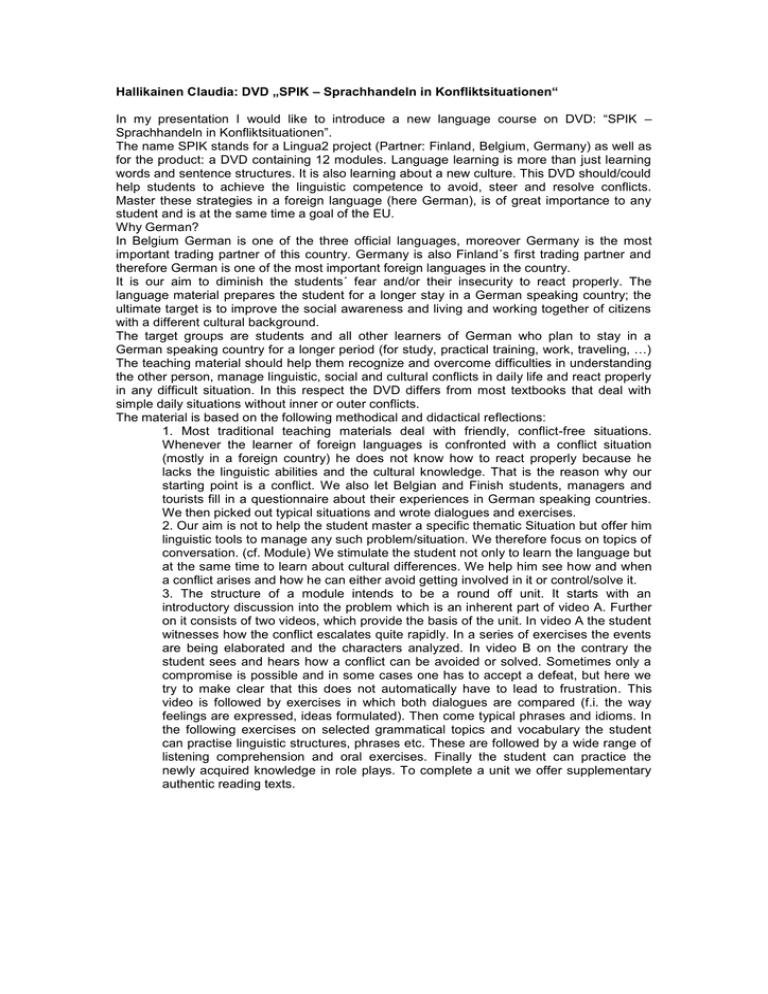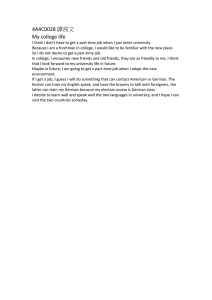Hallikainen Claudia: DVD „SPIK – Sprachhandeln in Konfliktsituationen“ Sprachhandeln in Konfliktsituationen”.
advertisement

Hallikainen Claudia: DVD „SPIK – Sprachhandeln in Konfliktsituationen“ In my presentation I would like to introduce a new language course on DVD: “SPIK – Sprachhandeln in Konfliktsituationen”. The name SPIK stands for a Lingua2 project (Partner: Finland, Belgium, Germany) as well as for the product: a DVD containing 12 modules. Language learning is more than just learning words and sentence structures. It is also learning about a new culture. This DVD should/could help students to achieve the linguistic competence to avoid, steer and resolve conflicts. Master these strategies in a foreign language (here German), is of great importance to any student and is at the same time a goal of the EU. Why German? In Belgium German is one of the three official languages, moreover Germany is the most important trading partner of this country. Germany is also Finland´s first trading partner and therefore German is one of the most important foreign languages in the country. It is our aim to diminish the students´ fear and/or their insecurity to react properly. The language material prepares the student for a longer stay in a German speaking country; the ultimate target is to improve the social awareness and living and working together of citizens with a different cultural background. The target groups are students and all other learners of German who plan to stay in a German speaking country for a longer period (for study, practical training, work, traveling, …) The teaching material should help them recognize and overcome difficulties in understanding the other person, manage linguistic, social and cultural conflicts in daily life and react properly in any difficult situation. In this respect the DVD differs from most textbooks that deal with simple daily situations without inner or outer conflicts. The material is based on the following methodical and didactical reflections: 1. Most traditional teaching materials deal with friendly, conflict-free situations. Whenever the learner of foreign languages is confronted with a conflict situation (mostly in a foreign country) he does not know how to react properly because he lacks the linguistic abilities and the cultural knowledge. That is the reason why our starting point is a conflict. We also let Belgian and Finish students, managers and tourists fill in a questionnaire about their experiences in German speaking countries. We then picked out typical situations and wrote dialogues and exercises. 2. Our aim is not to help the student master a specific thematic Situation but offer him linguistic tools to manage any such problem/situation. We therefore focus on topics of conversation. (cf. Module) We stimulate the student not only to learn the language but at the same time to learn about cultural differences. We help him see how and when a conflict arises and how he can either avoid getting involved in it or control/solve it. 3. The structure of a module intends to be a round off unit. It starts with an introductory discussion into the problem which is an inherent part of video A. Further on it consists of two videos, which provide the basis of the unit. In video A the student witnesses how the conflict escalates quite rapidly. In a series of exercises the events are being elaborated and the characters analyzed. In video B on the contrary the student sees and hears how a conflict can be avoided or solved. Sometimes only a compromise is possible and in some cases one has to accept a defeat, but here we try to make clear that this does not automatically have to lead to frustration. This video is followed by exercises in which both dialogues are compared (f.i. the way feelings are expressed, ideas formulated). Then come typical phrases and idioms. In the following exercises on selected grammatical topics and vocabulary the student can practise linguistic structures, phrases etc. These are followed by a wide range of listening comprehension and oral exercises. Finally the student can practice the newly acquired knowledge in role plays. To complete a unit we offer supplementary authentic reading texts.
